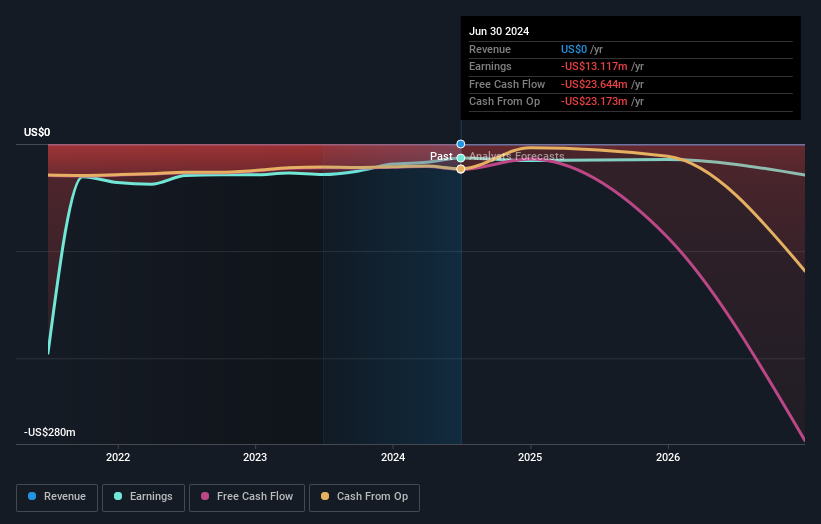With 46% ownership in Perpetua Resources Corp. (TSE:PPTA), hedge funds investors have a lot riding on the business
Key Insights
- Given the large stake in the stock by institutions, Perpetua Resources' stock price might be vulnerable to their trading decisions
- The top 3 shareholders own 53% of the company
- Analyst forecasts along with ownership data serve to give a strong idea about prospects for a business
Every investor in Perpetua Resources Corp. (TSE:PPTA) should be aware of the most powerful shareholder groups. The group holding the most number of shares in the company, around 46% to be precise, is hedge funds. In other words, the group stands to gain the most (or lose the most) from their investment into the company.
And as as result, hedge funds investors reaped the most rewards after the company's stock price gained 10% last week. The one-year return on investment is currently 158% and last week's gain would have been more than welcomed.
Let's take a closer look to see what the different types of shareholders can tell us about Perpetua Resources.
Check out our latest analysis for Perpetua Resources

What Does The Institutional Ownership Tell Us About Perpetua Resources?
Many institutions measure their performance against an index that approximates the local market. So they usually pay more attention to companies that are included in major indices.
As you can see, institutional investors have a fair amount of stake in Perpetua Resources. This suggests some credibility amongst professional investors. But we can't rely on that fact alone since institutions make bad investments sometimes, just like everyone does. If multiple institutions change their view on a stock at the same time, you could see the share price drop fast. It's therefore worth looking at Perpetua Resources' earnings history below. Of course, the future is what really matters.

It looks like hedge funds own 46% of Perpetua Resources shares. That worth noting, since hedge funds are often quite active investors, who may try to influence management. Many want to see value creation (and a higher share price) in the short term or medium term. Looking at our data, we can see that the largest shareholder is Paulson & Co. Inc. with 38% of shares outstanding. In comparison, the second and third largest shareholders hold about 7.8% and 7.2% of the stock.
To make our study more interesting, we found that the top 3 shareholders have a majority ownership in the company, meaning that they are powerful enough to influence the decisions of the company.
Researching institutional ownership is a good way to gauge and filter a stock's expected performance. The same can be achieved by studying analyst sentiments. There are plenty of analysts covering the stock, so it might be worth seeing what they are forecasting, too.
Insider Ownership Of Perpetua Resources
The definition of company insiders can be subjective and does vary between jurisdictions. Our data reflects individual insiders, capturing board members at the very least. The company management answer to the board and the latter should represent the interests of shareholders. Notably, sometimes top-level managers are on the board themselves.
Most consider insider ownership a positive because it can indicate the board is well aligned with other shareholders. However, on some occasions too much power is concentrated within this group.
Our information suggests that Perpetua Resources Corp. insiders own under 1% of the company. It appears that the board holds about CA$3.7m worth of stock. This compares to a market capitalization of CA$863m. Many investors in smaller companies prefer to see the board more heavily invested. You can click here to see if those insiders have been buying or selling.
General Public Ownership
The general public, who are usually individual investors, hold a 29% stake in Perpetua Resources. While this group can't necessarily call the shots, it can certainly have a real influence on how the company is run.
Next Steps:
I find it very interesting to look at who exactly owns a company. But to truly gain insight, we need to consider other information, too. For instance, we've identified 5 warning signs for Perpetua Resources (3 can't be ignored) that you should be aware of.
If you are like me, you may want to think about whether this company will grow or shrink. Luckily, you can check this free report showing analyst forecasts for its future.
NB: Figures in this article are calculated using data from the last twelve months, which refer to the 12-month period ending on the last date of the month the financial statement is dated. This may not be consistent with full year annual report figures.
Have feedback on this article? Concerned about the content? Get in touch with us directly. Alternatively, email editorial-team (at) simplywallst.com.
This article by Simply Wall St is general in nature. We provide commentary based on historical data and analyst forecasts only using an unbiased methodology and our articles are not intended to be financial advice. It does not constitute a recommendation to buy or sell any stock, and does not take account of your objectives, or your financial situation. We aim to bring you long-term focused analysis driven by fundamental data. Note that our analysis may not factor in the latest price-sensitive company announcements or qualitative material. Simply Wall St has no position in any stocks mentioned.
 Index Options
Index Options CME Group
CME Group Nasdaq
Nasdaq Cboe
Cboe TradingView
TradingView Wall Street Journal
Wall Street Journal